What is best led stage lights factories ? | Ultimate Insight
- Introduction: Facing the problem of finding the best LED stage lights factories
- What are the best LED stage lights factories and why they matter
- Core principles and main types of LED stage lights
- How LED stage lights work and why LED tech matters
- Main product categories manufactured by top factories
- How the best LED stage lights factories operate: R&D, production and QA
- R&D and product development
- Manufacturing capability and capacity
- Quality assurance and testing
- Case example: LQE as an example of a best LED stage lights factory
- Key decision criteria to identify the best LED stage lights factories
- 1. Product performance and photometrics
- 2. Thermal design and lifespan
- 3. R&D strength and patents
- 4. Production capacity and lead times
- 5. Quality control and certifications
- 6. Commercial terms: MOQ, pricing, warranty and support
- 7. After‑sales & technical support
- Buying checklist and negotiation tactics for commercial buyers
- Pre‑qualification steps when sourcing the best led stage lights factories
- Field testing and acceptance criteria
- Commercial negotiation tips
- Common misconceptions about the best LED stage lights factories
- Conclusion: How to select the best LED stage lights factories with confidence
- Sources and references
- Frequently Asked Questions
- Closing note
Introduction: Facing the problem of finding the best LED stage lights factories
Problem: Event producers, rental houses, and stage designers need reliable LED stage lighting but face a market crowded with suppliers claiming excellence. Choosing the wrong factory costs time, money, and reputation.
Agitation: Imagine delayed shipments before a tour, inconsistent color rendering across fixtures, or poor thermal design causing early failures—each problem directly hits show quality and budgets.
Solution: This guide explains how to identify the best led stage lights factories, what technical and commercial criteria matter, and how to validate suppliers—so you can buy fixtures that perform consistently, safely, and cost‑effectively.
What are the best LED stage lights factories and why they matter
Definition: The best led stage lights factories are manufacturers with demonstrated expertise in R&D, robust production processes, quality assurance protocols, relevant certifications, and reliable commercial terms that serve professional markets (theatre, concerts, broadcast, houses of worship, clubs).
Why it matters: Professional stage lighting is a capital investment expected to run for years under heavy use. Choosing a top factory affects fixture longevity, color consistency, energy efficiency, support availability, and total cost of ownership. For buyers with —rentals, production companies, integrators—factory selection is a strategic decision.
Core principles and main types of LED stage lights
How LED stage lights work and why LED tech matters
Modern LED stage lights use arrays of high‑power LEDs with optics, color mixing systems (RGB or multi‑chip), and digital control (DMX/RDM/ArtNet/sACN). Key technical pillars are LED binning and color stability, thermal management to protect LEDs, accurate optics for beam shaping, and reliable power electronics/consumers for dimming and flicker‑free output for broadcast.
Typical commercial performance benchmarks: LEDs commonly reach 50,000–100,000 hours of useful life, deliver 50–80% energy savings versus incandescent sources, and require precise thermal design to maintain lumen output and color over time.
Main product categories manufactured by top factories
Moving head spot/profile: High CRI options, framing shutters, gobos, motorized focus—used for theater and concert front‑of‑house.
Moving head wash: Wide coverage, smooth color blending for stage washes and touring rigs.
Beam/follow spot fixtures: Narrow, intense beams for dramatic effects in concerts and large venues.
Static fixtures (floods, PARs, battens): Ground and truss mounted for cyclorama, LED batten pixel mapping, and architectural washes.
Effect fixtures (strobes, audience blinders): High refresh rates and robust power delivery for intense effects and broadcast safety.
How the best LED stage lights factories operate: R&D, production and QA
R&D and product development
Top factories invest in X‑to‑Y development cycles: optical simulation, thermal CFD, LED bin selection, driver design, and firmware for precise color and movement control. A strong R&D team allows factories to innovate features that reduce lifecycle costs and enhance show reliability.
Manufacturing capability and capacity
Leading factories combine automated PCB assembly, controlled optics assembly, and dedicated aging/test lines to ensure consistent performance. Production scale matters: factories that can produce tens of thousands of units annually offer better pricing stability and predictable lead times for large orders.
Quality assurance and testing
Essential QA steps include 100% functional testing, burn‑in (aging) for a minimum number of hours, photometric verification (lux/CRI/TLCI), and vibration/shock testing for touring fixtures. Proper QA reduces field failures and warranty claims.
Case example: LQE as an example of a best LED stage lights factory
LQE, founded in 2008 and based in Foshan, China, positions itself as a professional OEM/ODM stage lighting manufacturer focusing on middle‑ and high‑end digital stage lighting. Key facts provided by the company illustrate attributes buyers look for in the best led stage lights factories.
| Attribute | LQE (factory example) |
|---|---|
| Founding year & headquarters | 2008, Foshan, China |
| Production base area | Approx. 10,000 square meters |
| Annual production capacity | Up to 100,000 lighting fixtures |
| Intellectual property | About 80 national patents |
| Product range | Moving heads, static lights, wash, beam, profile—suitable for theatres, concerts, studios, houses of worship, nightclubs, theme parks |
| Business model | OEM/ODM with focus on R&D, production, sales, and after‑sales support |
Key decision criteria to identify the best LED stage lights factories
1. Product performance and photometrics
Demand photometric reports: lux output at distances, beam angle, CRI/TLCI values, and CCT consistency. For broadcast and theatre, TLCI ≥ 90 and CRI ≥ 90 are common targets for accurate color rendering.
2. Thermal design and lifespan
Evaluate heat‑sink design, airflow path, and LED junction temperature specs. Reliable factories provide LM‑80 data and TM‑21 lifespan projections or equivalent performance evidence.
3. R&D strength and patents
Patents and a stable R&D team indicate ongoing product improvement and differentiation—important for mid‑to‑long term product support.
4. Production capacity and lead times
Confirm manufacturing capacity, average lead time, and contingency plans for spikes. Top factories can scale to tour or festival kit orders without long delays.
5. Quality control and certifications
Seek CE, RoHS, ETL/UL (as required by market), and electromagnetic compatibility tests. Ask for QC flow charts: incoming inspection, in‑line inspection, burn‑in, and final test reports.
6. Commercial terms: MOQ, pricing, warranty and support
Evaluate warranty length, spare parts availability, MOQ, payment terms, and whether the factory supports OEM/ODM branding. For rental companies, full‑coverage warranties and fast spare parts logistics are critical.
7. After‑sales & technical support
Check availability of service engineers, training materials, firmware updates, and global spare parts distribution. The best factories maintain a support network and offer clear RMA processes.
| Buyer Priority | Small Factory | Top‑Tier OEM/ODM (e.g., LQE) |
|---|---|---|
| Quality & Photometrics | Variable | Consistent, documented |
| R&D & Patents | Limited | Strong (patents & product teams) |
| Capacity & Lead Time | Low–medium | High, scalable |
| After‑sales Support | Basic | Structured global support |
| Unit Price | Often lower per unit (but riskier) | Competitive with better value |
Buying checklist and negotiation tactics for commercial buyers
Pre‑qualification steps when sourcing the best led stage lights factories
Ask for: company registration, factory photos, production capacity, QC process, certificates, a list of reference clients, and sample photometric reports. Request sample units for field testing under realistic conditions.
Field testing and acceptance criteria
Run sample units for burn‑in (72–168 hours), verify color matching across units, test DMX control, check flicker at camera frame rates, and measure output decay. Define acceptance criteria in writing before placing large orders.
Commercial negotiation tips
Negotiate clear warranty terms, spare parts lead time, MOQ, price breaks by volume, and penalties or remedies for late delivery. Consider an initial smaller trial order before committing to full fleets.
Common misconceptions about the best LED stage lights factories
Misconception 1: Lowest price equals best value. Reality: Long‑term costs (warranty claims, energy, maintenance, downtime) often make slightly higher quality fixtures cheaper over lifecycle.
Misconception 2: All LEDs are the same. Reality: LED binning, optics, and thermal engineering create major differences in performance and life.
Conclusion: How to select the best LED stage lights factories with confidence
Finding the best led stage lights factories requires a balanced assessment of technical performance, manufacturing robustness, certifications, supply capacity, and commercial support. Use documented photometrics, insist on sample validation, verify R&D credentials and patents, and secure clear warranty and spare parts commitments. A factory like LQE—established, patent‑rich, with large production capacity—illustrates the profile of a supplier that can meet professional buyer needs for reliability and long‑term value.
Make selection decisions based on lifecycle cost, not only purchase price. When you prioritize photometric performance, thermal reliability, and structured after‑sales support, you choose factories that reduce risk for tours, productions, and installations.
Sources and references
Below are reputable industry resources and standards commonly used to verify technical and market information:
- Company data provided by LQE (founding year, location, production scale, patents)
- Illuminating Engineering Society (IES) – guidelines on photometrics and light measurement
- U.S. Department of Energy – information on LED benefits and efficacy
- PLASA (Professional Lighting and Sound Association) – industry insights and standards
- Industry market reports (Grand View Research, MarketsandMarkets) for professional lighting market trends
Frequently Asked Questions
Q: What certifications should I require from an LED stage lights factory?A: Require CE and RoHS for EU compliance, and ETL/UL if you sell into North America. Also ask for EMC/EMI test reports and ISO 9001 evidence of quality management systems.
Q: How long should LED stage lights last from a top factory?A: High‑quality LED fixtures commonly have projected useful lives between 50,000 and 100,000 hours depending on operating conditions; expect design lifespans backed by thermal specifications and LM‑80/TM‑21 data where available.
Q: Is it better to buy from a big OEM/ODM or a small boutique manufacturer?A: For large fleets and rental/touring use, big OEM/ODM factories generally provide more predictable quality, spare parts, and capacity. Small manufacturers can be excellent for niche, highly customized fixtures but may pose risks for large orders.
Q: What tests should I run on sample fixtures before final purchase?A: Run burn‑in for several days, measure lux/beam angle/CRI/TLCI, test DMX control and firmware stability, verify flicker performance at camera frame rates, and validate IP/Ingress protection if used outdoors.
Q: How do patents and R&D strength affect my purchase decision?A: Patents indicate a factory invests in innovation and can offer differentiated features; R&D strength correlates with faster firmware fixes, ongoing product improvements, and better long‑term support.
Q: What causes color mismatch between fixtures from the same factory and how to avoid it?A: Color mismatch often results from inconsistent LED binning or poor color calibration. Avoid it by requesting consistent bin selection, factory color calibration reports, and on‑site cross‑patch testing before large deployments.
Q: How important is after‑sales support and spare parts availability?A: Critical. Fast spare part fulfillment and clear RMA processes minimize downtime. Verify local distributor support or express spare‑part logistics when buying for tours or long‑term installations.
Q: What payment terms are common when ordering from the best LED stage lights factories?A: Typical terms include 30–50% deposit with order and balance before shipment or on B/L. Negotiate milestones, and consider escrow or documentary collections for new suppliers.
Closing note
Selecting the best led stage lights factories is a strategic investment. Focus on verified performance data, strong R&D, scalable manufacturing, solid QA, and reliable after‑sales services. Use the checklist and tests above, and treat suppliers like long‑term partners to protect show quality and reduce total ownership costs.
Best led stage light bar manufacturers and supplier brands in us
Best Moving Head Lights for Weddings and Events
What are the application scenarios of aquarium light par?
Best moving head stage lighting with big head manufacturers and supplier brands in us
1000w
Does LQE Offer a Stage Light Design Solution?
LQE experienced team glad to supply a stage lighting configuration design solution or suggestion for projector who don’t have much experience in lighting design, project, theatre and studio.
Can I Have a Sample Order for an LED DJ Light?
Sure, sample order are welcome to test and check LQE quality. Mixed samples are acceptable.
Distributor
How can I apply to become a distributor?
Simply fill out the contact form on this page or email us directly with your company information, market background, and cooperation intention. Our sales team will get in touch with you within 1–2 business days.
What are the advantages of becoming an LQE distributor?
Access to high-performance, patented lighting products
Competitive factory pricing and excellent profit margin potential
Strong R&D capabilities with 80+ national patents
Reliable production capacity: 100,000 units annually
Dedicated account manager to support your growth
What is your typical lead time for distributor orders?
Our standard production lead time is 15–30 working days depending on order volume and customization requirements. For stocked models or repeat orders, we can offer shorter delivery times.
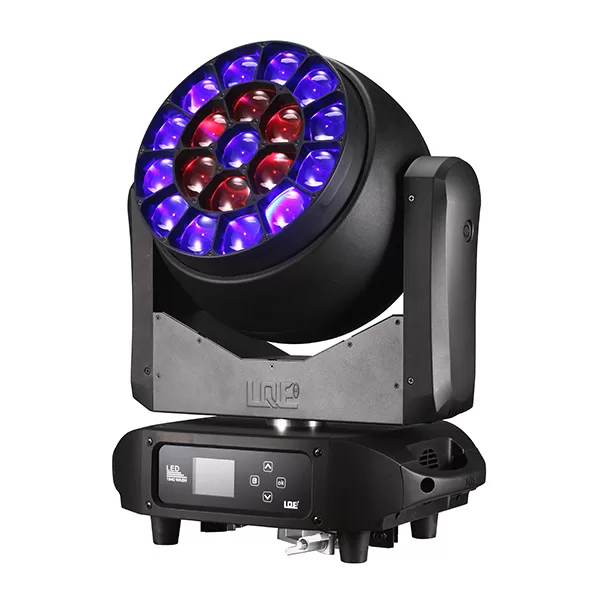
600w 19x40w RGBW Stage Moving Head Wash Light LW600 Zoom IP20
600W 19x40W LED RGBW Mulichips Moving Head Wash Lights with Zoom (5°–50°), Covering Large Range and Long Distance. IP20: Designed to deliver a 5°–50° ultra-large zoom range to achieve a greater wash effect, illuminating stages and events with stunning ring control lighting effects.
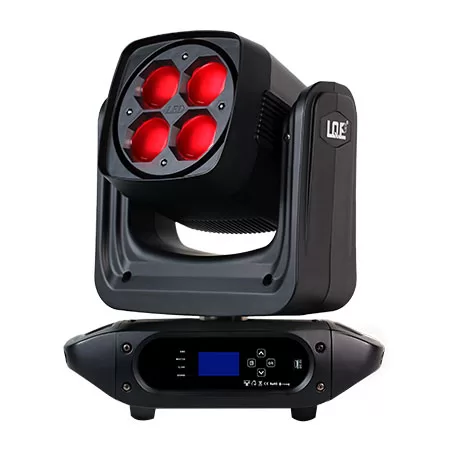
LED Moving Head Stage Wash Light LW200Z
The versatile moving head stage light provides a powerful lighting solution for theaters, concerts, and large outdoor performances. Suitable for theaters, TV stations, entertainment stages, and large outdoor performance scenes.
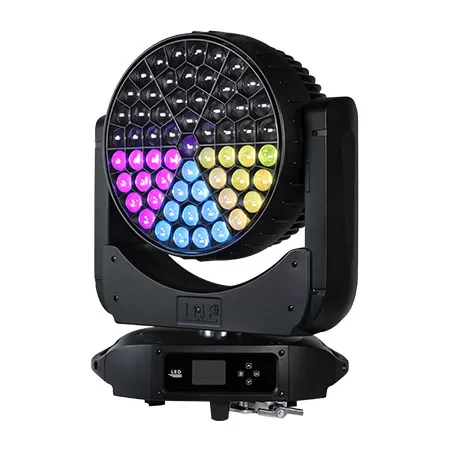
1000w 61x40w RGBW Stage Moving Head Wash Light LW1000
1000W 61x40W LED RGBW Mulichips Moving Head Wash Lights with Zoom (5°–50°), Covering Large Range and Long Distance. Designed to deliver a 5°–50° ultra-large zoom range to achieve a greater wash effect, illuminating stages and events with stunning lighting effects.
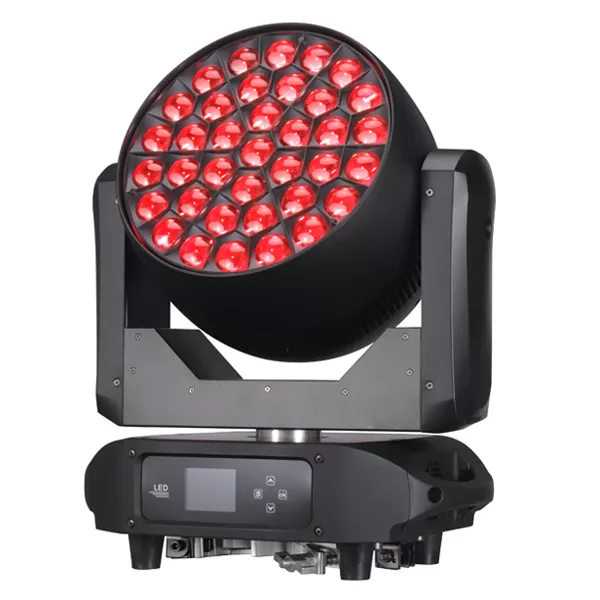
800w 37x40w RGBW Stage Moving Head Wash Light LW800
800W 37x40W LED RGBW Mulichips Moving Head Wash Lights with Zoom (5°-50°), Covering Large Range and Long Distance. Designed to deliver a 5°–50° ultra-large zoom range to achieve a greater wash effect, illuminating stages and events with stunning ring control lighting effects.

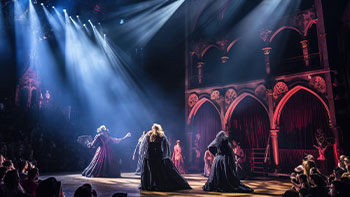
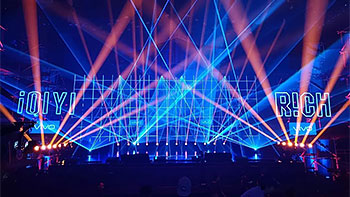
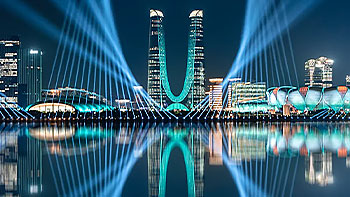
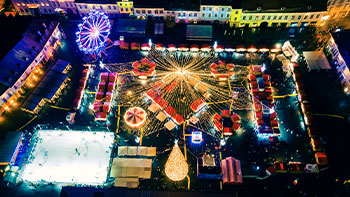
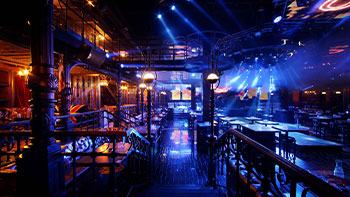
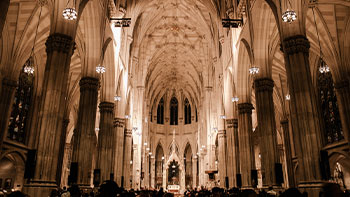






Linkedin
YouTube
Whatsapp: +8618924548390
TikTok